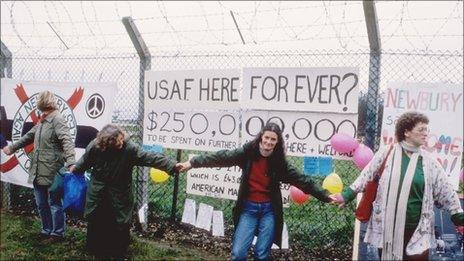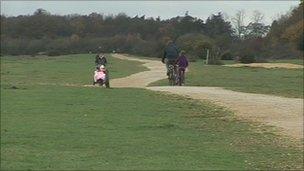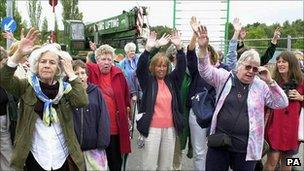'Key' role of women from Wales in Greenham peace camp
- Published

Women chained themselves to the nine-mile fence around the US base
Campaigners have recalled how a march from Cardiff to the US base at Greenham Common 30 years ago began a peace camp that attracted worldwide attention.
The protest mostly involved women, with the aim of raising awareness of plans to install nuclear Cruise missiles at the Berkshire site.
One, Sue Lent, said nothing would have happened without the "crucial" role of women from Wales in 1981.
The camp lasted until 2000 as a symbol of opposition to nuclear weapons.
It was on 26 August, 1981 that a group of about 40 women - and some men - began their walk from Cardiff City Hall to Greenham Common, which had been a US base since 1943.
In 1979 Nato decided to base Cruise missiles at Greenham, which prompted a number of women from Wales, including Karmen Thomas and Ann Pettit, to organise the march.
Ms Thomas said: "Ann Pettit was inspired by a similar march in Copenhagen and she came to me with the idea of doing a march from Cardiff to Greenham and it just sparked. Why not?
"There were four of us - young women who were married with small children," she told BBC Radio Wales.
"It took us about three months altogether. And this was pre-computer, [before] the technical age where if you wanted to contact people to arrange where you could stay... it was by letter and phone call and waiting for the response and then carrying on from there."

Thirty years on, Greenham Common is now a nature reserve and business park
She said they were not taken seriously initially by the likes of the Campaign for Nuclear Disarmament (CND).
"The idea of a group of women with their children marching across the countryside to bring awareness of Cruise didn't really inspire them as a logical thing to do," she said.
She was a CND member and said she was inspired to act by her fear in a "very uncertain world".
'Different ideals'
"I had a small boy and I was worried for him and I just felt I needed to do something."
But she said there were misconceptions about the marchers.
"A lot of people think it was women-only, but actually there were young men that came along who did the babysitting when we had meetings to discuss what we were going to do next.
"We varied greatly in age. There were some women who were in their sixties, and we all had quite different ideals and different ways of living.
"Some of us had professions. It wasn't earth motherly at all really."
Another marcher was Sue Lent, who had a baby with her and originally intended going only from Cardiff to Newport.
"But there were lots of women who were very supportive and I felt it was a very worthwhile cause," said Ms Lent.
"So at the end of the first day I went back and got my stuff and carried on the whole 10 days.
She said the original intention had not been to set up camp at Greenham, but the idea grew when the march failed to make the impact they wanted.
'Owned by the people'
"So a decision was made that some women would chain themselves to the railings and we would ask for an interview with the commander of the base.

Peace camp members watch the last caravan leave in September 2000
"And it just turned into people staying that night, and then the next night and the next night and people putting up tents, and it became a peace camp.
"And it gradually became known over the next few months and it became very much a focus both nationally and internationally eventually."
The base became the site of clashes between demonstrators and the police over the next few years.
After the Cold War ended in 1988, Greenham Common was emptied of missiles and the base was formally handed back to the RAF in 1992.
On Saturday, 3 September many of those involved in the camp will travel again from Wales to Greenham for a commemorative event.
Ms Lent said: "The Cruise missiles went, the air base has gone, the common is a common again. And it's gone back to being owned by the people again.
"Without the women planning the march the camp would never have been set up.
"The fact that it was women-focused made a huge difference because it attracted other women.
"It particularly got over the whole aspect of women bringing children into the world and not knowing what sort of world they were bringing them into and the whole fear of nuclear weapons.
"So I think Welsh women played a critical role: without them nothing would have happened."
- Published20 August 2010